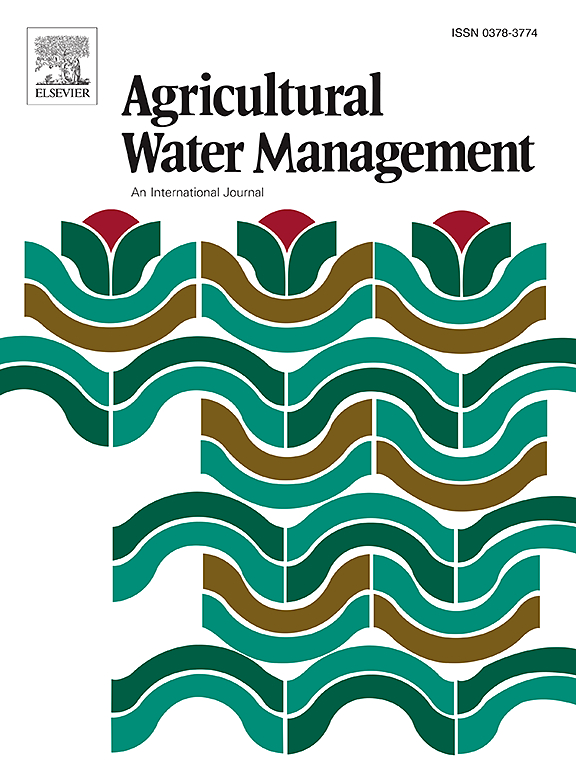Clonal integration alters metabolic non-structural carbohydrate processes of a dwarf bamboo under negatively correlated light and soil water conditions
IF 5.9
1区 农林科学
Q1 AGRONOMY
引用次数: 0
Abstract
Generally spoken that light and soil water conditions within patches often negatively correlate, significantly affecting the growth of clonal plants. But the role of clonal integration in modulating carbohydrate metabolism of paired ramets under heterogeneous environments remains unclear. Hence the initial research is performed focusing on water and carbohydrate sharing among ramets under heterogeneous environments and its impact on non-structural carbohydrate (NSC) accumulation and conversion of whole clonal system. Connected and disconnected clonal fragments of dwarf bamboo were planted in four heterogeneous environments differing in patch contrast with negatively correlated light and soil water. Photosynthetic capacity, NSC content, and its metabolic characteristics were measured, and the effects of water and NSC sharing on the performance of paired bamboo ramets were also analyzed. Leaf photosynthetic rate (Pn) and NSC content of shade ramets ranged from 7.06 to 8.56μmol·m−2·s−1, 140.85–176.12 mg.g−1, and those for unshaded ramets were 3.98 ∼6.97μmol·m−2·s−1 and 129.58–170.81 mg.g−1, respectively. Rhizome connection significantly decreased leaf Pn, NSC, chlorophyll, and RuBisCo in shaded ramets but increased these parameters in unshaded ramets. High water contrast led to higher leaf Pn, NSC, chlorophyll, and RuBisCo activity in both ramets with rhizome connection. Moderately shaded treatments (50 % shading) increased leaf Pn, NSC, and chlorophyll content in both shaded and unshaded ramets with rhizome connection. Rhizome connection significantly decreased the activities of sucrose synthase (SS), sucrose phosphate synthase (SPS), and amylase in shaded ramets, but increased SS, SPS, amylase, and invertase (INV) in unshaded ramets. Water sharing promoted both leaf NSC and Pn in ramets growing under high light but low soil water conditions when connected to ramets growing under shading but higher soil water conditions. The mutual conversion of starch into sugar between paired ramets enhanced the fitness of the entire clonal system. Obviously the findings provide new insights into the adaptive strategies of dwarf bamboo to drought and shading stress through physiological integration (water and NSC sharing) and NSC conversion, which could help predict the impact of climate change on bamboo growth and productivity.
克隆整合改变了一种矮竹在光照和土壤水分负相关条件下的非结构性碳水化合物代谢过程
一般说来,斑块内的光照和土壤水分条件往往呈负相关,严重影响克隆植物的生长。但在异质环境下,克隆整合在调节配对公羊碳水化合物代谢中的作用仍不清楚。因此,初步研究的重点是在异质环境下公羊之间的水分和碳水化合物共享及其对整个克隆系统的非结构性碳水化合物(NSC)积累和转化的影响。在光照和土壤水分呈负相关的四种异质环境中种植了相连和不相连的矮竹克隆片段。测量了光合能力、NSC含量及其代谢特征,并分析了水分和NSC共享对配对竹节性能的影响。遮荫竹子的叶片光合速率(Pn)和NSC含量分别为7.06~8.56μmol-m-2-s-1、140.85~176.12 mg.g-1,无遮荫竹子的叶片光合速率(Pn)和NSC含量分别为3.98~6.97μmol-m-2-s-1、129.58~170.81 mg.g-1。根状茎连接明显降低了遮荫子座的叶片Pn、NSC、叶绿素和RuBisCo,但增加了无遮荫子座的这些参数。高水分对比导致有根状茎连接的两个柱头的叶片 Pn、NSC、叶绿素和 RuBisCo 活性较高。中度遮荫处理(50% 遮荫率)增加了有根茎连接的遮荫和无遮荫子座的叶片 Pn、NSC 和叶绿素含量。根茎连接明显降低了遮荫子座中蔗糖合成酶(SS)、蔗糖磷酸合成酶(SPS)和淀粉酶的活性,但提高了未遮荫子座中蔗糖合成酶、蔗糖磷酸合成酶、淀粉酶和转化酶(INV)的活性。在高光照但土壤水分较低的条件下生长的植株与在遮光但土壤水分较高的条件下生长的植株相连接时,水分共享促进了叶片 NSC 和 Pn。配对植株之间相互将淀粉转化为糖分,提高了整个克隆系统的适应性。显然,这些研究结果为矮竹通过生理整合(水分和非转基因物质共享)和非转基因物质转化来适应干旱和遮荫胁迫的策略提供了新的见解,有助于预测气候变化对竹子生长和生产力的影响。
本文章由计算机程序翻译,如有差异,请以英文原文为准。
求助全文
约1分钟内获得全文
求助全文
来源期刊

Agricultural Water Management
农林科学-农艺学
CiteScore
12.10
自引率
14.90%
发文量
648
审稿时长
4.9 months
期刊介绍:
Agricultural Water Management publishes papers of international significance relating to the science, economics, and policy of agricultural water management. In all cases, manuscripts must address implications and provide insight regarding agricultural water management.
 求助内容:
求助内容: 应助结果提醒方式:
应助结果提醒方式:


